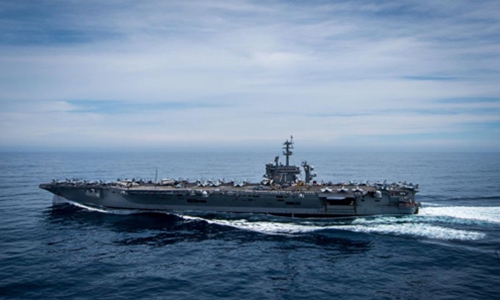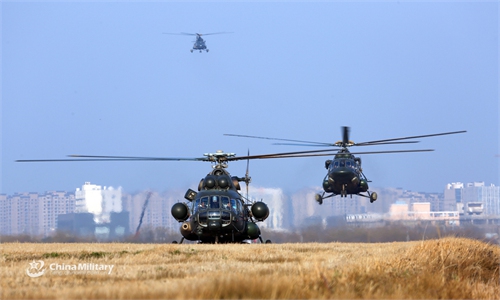
USS Theodore Roosevelt transits the Pacific Ocean on April 7, 2017. Photo: US Navy
US President Joe Biden is scheduled to submit the Fiscal Year 2022 budget to Congress on Friday. US media has disclosed in advance that in this $6 trillion budget, $753 billion will be used for defense, an increase of 1.7 percent over the 2021 figure. The huge investment in the US nuclear triad and the support in the Pacific Deterrence Initiative have received particular attention.
This is the largest budget with the most shocking national defense expenditure worldwide. It is worth mentioning that the 1.7 percent increase given by the Democratic government is considered too little by many Republicans. The US defense budget is still about four times that of China, and is almost the sum of the defense budgets of the 15 countries that follow. But there is still such a domestic response. People can imagine how distorted and deformed the US' overall national security concept is.
What the US wants is absolute security. One of its meanings is that it can overwhelm other major powers' will on key issues at critical moments. This is a completely unrealistic goal. The US still feels anxious despite the fact that its defense budget is far ahead. Washington always feels that the defense budget should grow.
The US' national defense has in fact gone beyond the traditional military field, pursuing the overflow of various functions to maintain global hegemony. The US economy is increasingly relying on the hegemony of the US dollar and the country's dominant position in international politics and ideology. The US' super military power has compensated for the weakening of its actual competitiveness in these systems.
In the past, US technological leadership and economic advantages were absolute. But now, such superiority is shrinking. It is complicated to maintain the leadership in those areas, but it is simple and encouraging to raise military expenditure. Thus, the US has unrestrainedly let itself stay deformed as a system.
However, this is destined to be very inefficient. It will cause fundamental trouble to the healthy functioning of the international community and disrupt people's traditional sense of national security. The US could have definitely been the most secure country worldwide, but it has always believed it has the most security challenges. As long as other countries' national strength has increased - although still not as strong as the US and they have no willingness to confront it - the US will have a sense of being threatened.
Washington has perverted greed for national security, and China's rise will definitely have a subversive psychological impact on the US. If China increases its military expenditure by one dollar, then the US will increase by a few dollars to maintain the gap with China. It will stop improving infrastructure or expanding people's welfare, but it will be still not even enough to put all other increased budgets into the defense budget. This is an ambition which is impossible to realize.
China will not be in an arms race with the US. The increase in China's defense budget and military strength is the natural result of economic development and technological progress. Everything happened naturally and China does not need to make difficult choices. China does not have the will to challenge the US worldwide, but we cannot allow the US to act arbitrarily in the West Pacific, especially in China's coastal waters, to harm China's interests. China's determination is also unwavering, and China's development and increasing military expenditure will be sufficient to support our will.
China will not seek to build a nuclear arsenal as large as that of the US, but our nuclear power building will continue to advance to consolidate sufficient and effective nuclear deterrence, especially deterrence against the US. We are convinced that we can achieve this more easily and realistically than the US' attempt to intimidate China by further strengthening nuclear power.
The US' more than $700 billion defense budget is a super show for itself and its allies. It aims at intimidating other countries, but it is only useless facing major powers like China and Russia. Even if the US doubles its defense budget, it cannot form a strategic repressive force against China and Russia as it imagines. Beijing and Moscow's capability of resolutely resisting the US in terms of their core interests will only be more sufficient.
The big bubble of the US military expenditure will eventually burst. It cannot be a compensation for other declines in US competitiveness for long. Time will prove this.


